Workforce Readiness
Research References
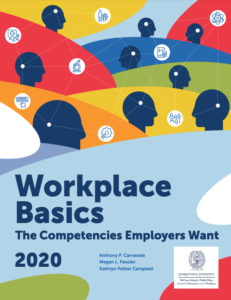 Workers need more than just their educational credentials to qualify for jobs that pay well, keep those jobs, secure promotions, and boost their earnings on the job. The new report by Georgetown University Center on Education and the Workforce entitled Workplace Basics: The Competencies Employers Want reveals the five most in-demand competencies across the labor market..
Workers need more than just their educational credentials to qualify for jobs that pay well, keep those jobs, secure promotions, and boost their earnings on the job. The new report by Georgetown University Center on Education and the Workforce entitled Workplace Basics: The Competencies Employers Want reveals the five most in-demand competencies across the labor market..
Carnevale, A. P., Fasules, M. L., & Campbell, K. P. (2020). Workplace Basics: The Competencies Employers Want (Rep.). Washington, DC: Georgetown University Center on Education and the Workforce.
Retrieved from https://www.tandfonline.com/doi/full/10.1080/08832323.2018.1541854
Research shows that adolescents transitioning to adulthood are eager to enter the workforce and begin their careers, but many will be underprepared for the types of responsibilities that their new positions will entail. Subjectively identifying the skills that current workers believe will be necessary for future job success provides insight into how school curriculum may adapt to the changing economy and better support their students. This study explores the viewpoints of workers and the skills that they will need to take the next steps in their careers.
Brown, W. (2019). Guiding the Path: Identified Skills for Educating the Next Generation of Workers. Journal of Education for Business, 94(6), 400–407.
Retrieved from https://www.tandfonline.com/doi/full/10.1080/08832323.2018.1541854
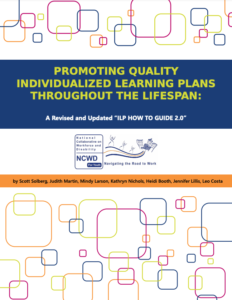 Promoting Quality Individualized Learning Plans throughout the Lifespan: A Revised and Updated ILP How to Guide 2.0 expands upon the guidance and resources in NCWD/Youth’s earlier ILP How to Guide. ILP How to Guide 2.0 provides career development resources and examples of ILP implementation for an expanded range of age groups and settings including elementary and secondary school, postsecondary education, workforce development programs and other non-school settings. It also offers strategies for building and supporting capacity at the local level to facilitate adoption of the ILP process and provides examples of how to ensure that ILPs are implemented with quality.
Promoting Quality Individualized Learning Plans throughout the Lifespan: A Revised and Updated ILP How to Guide 2.0 expands upon the guidance and resources in NCWD/Youth’s earlier ILP How to Guide. ILP How to Guide 2.0 provides career development resources and examples of ILP implementation for an expanded range of age groups and settings including elementary and secondary school, postsecondary education, workforce development programs and other non-school settings. It also offers strategies for building and supporting capacity at the local level to facilitate adoption of the ILP process and provides examples of how to ensure that ILPs are implemented with quality.
Solberg, S., Martin, J., Larson, M., Nichols, K., Booth, H., Lillis, J., & Costa, L. (2018, March 19). Promoting Quality Individualized Learning Plans throughout the Lifespan: A Revised and Updated ILP How to Guide 2.0.
Retrieved from
http://www.ncwd-youth.info/wp-content/uploads/2018/03/Promoting-Quality-ILPs-Throughout-the-Lifespan-WEB.pdf
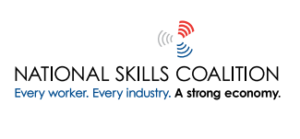 To help more individuals access the training they need to succeed in the current labor market, employers across a range of industries have been partnering with community college leaders and other stakeholders to remove barriers to success and provide flexible career pathways for millions of Americans. By working together, these industry-driven partnerships—sometimes referred to as sector partnerships—can provide innovative course curriculum, professional development, and support services to individuals looking to build marketable skill sets. This report reviews several case studies and recommends policy.
To help more individuals access the training they need to succeed in the current labor market, employers across a range of industries have been partnering with community college leaders and other stakeholders to remove barriers to success and provide flexible career pathways for millions of Americans. By working together, these industry-driven partnerships—sometimes referred to as sector partnerships—can provide innovative course curriculum, professional development, and support services to individuals looking to build marketable skill sets. This report reviews several case studies and recommends policy.
Brown, K. (2018). Powerful Partners: Businesses and Community Colleges – How Investments in Sector Partnerships Can Help Our Economy Thrive (Rep.). Washington, D.C.: National Skills Coalition.
Retrieved from https://m.nationalskillscoalition.org/resources/publications/file/Powerful-Partners-Businesses-and-Community-Colleges.pdf
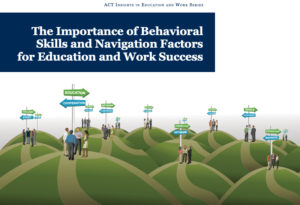 Over the past decade, there has been greater recognition by educators, employers, and policymakers of the importance of behavioral skills and navigation factors (e.g., dependability, cooperation, interests, and goals) for education and career success. A growing body of research shows that these factors contribute to diverse positive outcomes in both education and workforce settings. This report focuses on behavioral skills and navigation factors (drawn from the ACT Holistic Framework) that elementary, middle, and high school teachers, college instructors, and workforce supervisors consider important for success.
Over the past decade, there has been greater recognition by educators, employers, and policymakers of the importance of behavioral skills and navigation factors (e.g., dependability, cooperation, interests, and goals) for education and career success. A growing body of research shows that these factors contribute to diverse positive outcomes in both education and workforce settings. This report focuses on behavioral skills and navigation factors (drawn from the ACT Holistic Framework) that elementary, middle, and high school teachers, college instructors, and workforce supervisors consider important for success.
Eichert, D. M., Latino, C. A., Bobek, B. L., Way, J., & Casillas, A. (2017). The Importance of Behavioral Skills and Navigation Factors for Education and Work Success. Iowa City, IA: ACT, Inc.
Retrieved from https://https://files.eric.ed.gov/fulltext/ED583586.pdf/doi/full/10.1086/702731
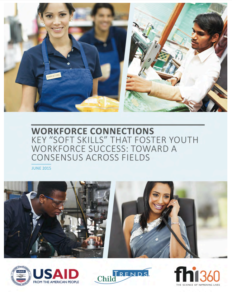 This report helps bring clarity to the field by recommending a research-based set of key soft skills that increase the chance that youth ages 15–29 will be successful in the workforce. These recommendations emerge from a multi-faceted study that includes an extensive review of research as well as broad stakeholder input. The authors of this report reviewed more than 380 resources from around the world, including rigorous empirical studies, employer studies, and findings of international consensus projects. These resources examined the relationship between soft skills and key workforce outcomes, including employment, performance on the job, wages, and entrepreneurial success.
This report helps bring clarity to the field by recommending a research-based set of key soft skills that increase the chance that youth ages 15–29 will be successful in the workforce. These recommendations emerge from a multi-faceted study that includes an extensive review of research as well as broad stakeholder input. The authors of this report reviewed more than 380 resources from around the world, including rigorous empirical studies, employer studies, and findings of international consensus projects. These resources examined the relationship between soft skills and key workforce outcomes, including employment, performance on the job, wages, and entrepreneurial success.
Lippman, L. H., Ryberg, R., Carney, R., & Moore, K. A. (2015). Key “Soft Skills” that Foster Workforce Success: Toward a Consensus Across Fields. Child Trends.
Retrieved from https://www.childtrends.org/wp-content/uploads/2015/06/2015-24WFCSoftSkills1.pdf
The career landscape has changed dramatically over the past two decades with the adoption of technology and an increasingly global and virtual workforce. As a result, schools and academic institutions must go beyond current curriculum to teach and develop the new skills and competencies that are required to keep pace with the demands of careers in the 21st century. This article examines the adoption of the Odyssey of the Mind program–a competitive creative problem-solving model–as a way to teach, develop, and demonstrate social emotional intelligence and other related soft skills that are necessary to master for current and future career success.
Wasik, S. Z., & Barrow, J. (2017). Odyssey of the Mind: Using a Creative Problem-Solving Competition to Promote Career Readiness in Elementary School. Journal of Education, 197(3), 46–50.
Retrieved from https://journals.sagepub.com/doi/10.1177/0022057418782335
Workforce Readiness Research Documents
- U. S. Chamber of Commerce Foundation Center for Education and Workforce. (2015). “Making Youth Employment Work: Essential Elements for a Successful Strategy.” Retrieved from https://ns4ed.s3.us-east-2.amazonaws.com/workforce+readiness/making-youth-employment-work.pdf
- Showalter, T, Spiker, K. (2016). “Promising Practices in Work-Based Learning for Youth.” Retrieved from https://ns4ed.s3.us-east-2.amazonaws.com/workforce+readiness/10-4-nsc-youthworkbasedlearning_v4.pdf
- National Skills Coalition. (2016). “WIOA, Perkins, and ESSA: Intersections and Opportunities.” Retrieved from https://ns4ed.s3.us-east-2.amazonaws.com/workforce+readiness/nsc-advance-cte-ccsso-cri-presentation_final.pdf
- Nagle, R. (2010). “Hiring, Retention and Training. Employers: Perspectives on Trade and Soft Skills in South Carolina.” Retrieved from https://ns4ed.s3.us-east-2.amazonaws.com/workforce+readiness/hiring_retention_and_training_-_employers_perspectives_on_trade_and_soft_skills_in_south_carolina_20102.pdf
- Harvard Graduate School of Education. (2010). “Pathways to Prosperity.” Retrieved from https://ns4ed.s3.us-east-2.amazonaws.com/workforce+readiness/pathways_to_prosperity_feb2011.pdf